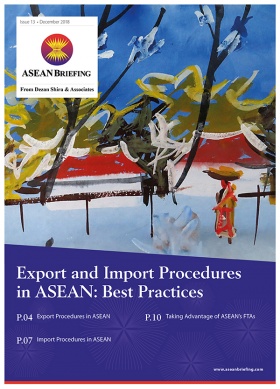Malaysia’s Investment Outlook for 2019
Malaysia’s post-election outlook appears challenging for the new government led by Prime Minister Mahathir Mohamad who made a come-back to the political scene. After his election, Mahathir immediately sought to cut costly infrastructure expenditure to ease government debt incurred by his predecessor.
At present, Malaysia’s consumer price inflation is lowest among Southeast Asian countries except Singapore. As of November 2018, its inflation rate slowed down to 0.2 percent year-on-year from 0.6 percent in the previous month. Moreover, the country’s foreign direct investment increased by 350 percent, or a total of RM49 billion (US$11.8 billion) in the first nine months of 2018.
Malaysia’s investment environment remains promising for foreign investors despite the slowing down of the global economy. The continued growth of the Services and Manufacturing sector, not to mention private consumption as the top growth performer, makes investing in Malaysia imperative for market players.
Economy
Malaysia’s 2019 budget was crafted such that an ‘entrepreneurial economy’ can bring economic prosperity.
Under the theme, ‘Credible Malaysia, Dynamic Economy, Prosperous Rakyat”, the country is preparing for an economic boost by promoting entrepreneurial activities which rely mostly on innovation and creativity.The growth of the digital economy in Malaysia corresponds with the future of an entrepreneurial economy. In 2017, the Digital Free Trade Zone was established in order to assist and empower entrepreneurs toward E-commerce and modernization.
The Malaysian government has given a major boost to SMEs through its national budget allocation for 2019. For example, RM200 million (US$48.3M) has been set aside for the wholesale and retail industry. Other SME-friendly measures included RM100 million (US$24.1M) fund for TEKUN Nasional under the Ministry of Entrepreneur Development, RM20million (US$4.8M) for Buy Malaysian Product Campaign, RM210million (US$50.7M) fund for Industry 4.0 program, RM2billion (US$483M) for Green Technology Financing Scheme and RM2billion soft loan for modernization under the Business Loan Guarantee Scheme.
SMEs in the country account for 98.5 percent of Malaysia’s businesses, comprised mainly of 89.2 percent from Services sector and 5.3 percent from the Manufacturing sector.
Meanwhile, the Special Voluntary Disclosure Programme launched on November 2018 has given an opportunity for businesses to reduce their penalties to as low as 10 percent in terms of errors made in their accounts or audits.
Investment Climate
Real Property Gains Tax (RPGT)
The revision of the Real Property Gains Tax rate in Malaysia is one of the latest steps undertaken by the Malaysian government to increase the national revenue. It is also intended to prompt buying of property and allow consumers to hold their homes longer for their own use. Further, this move is seen to provide opportunity for the housing and construction sector since it will make it easier for the lower-income group to own a house.
The RPGT exemption for the disposal of properties in the sixth year of ownership including low-cost houses, low-medium cost houses and affordable houses took effect on January 1, 2019.
RPGT incremental rates for disposal of real estate are as follows:
- Increase to 10 percent from 5 percent for companies;
- Increase to 5 percent from 0 percent for citizens and permanent residents; and
- Increase to 10 percent from 5 percent for non-citizens and non-permanent residents.
Malaysia’s real estate market is value-driven which makes it attractive for property investments. The increase in RPGT rates is meant to prevent speculators from bulk buying and causing steep increase in property prices. Further, it does not affect long-term investors as the rates are only imposed on capital gains instead of its selling prices.
Sales and Service Tax (SST)
The re-introduction of SST, which replaced the Goods and Services Tax (GST) after just three years of its implementation, benefits importers, manufacturers and service providers as it only taxes once. Under this single-stage tax regime, the standard 6 percent GST rate is now subjected to GST at 0 percent.
SST has been implemented since September 1, 2018 and it provides service tax exemption to taxable services in the country including those that are imported by Malaysian companies from foreign companies. The food and beverage industry benefits from this new tax system because it is exempted from charging SST.
This new scheme might cause financial and administrative burden to businesses, but the Malaysian government is to address such uncertainties by providing further clarification or guidelines.
Nevertheless, businesses that are liable to register for SST and has ensured that their existing system can support SST 2.0 will gain additional investments.
The Malaysian government has recently amended the Labuan Business Activity Tax Act which reduced corporate tax from 18 percent to 17 percent, offered to companies with a paid-up capital of up to RM2.5 million (US$604,000) or limited liability partnerships with a total capital contribution of not more than RM2.5 million.
Outlook for 2019
Although the Asian Development Bank maintains Malaysia’s growth outlook at 5 percent in 2019 from 5.3 percent in 2018, stable labor market, higher wages and cutdown on government spending help to sustain private and public consumption altogether.
Private investments are also expected to rise, with capital outlays coming from the Services and Manufacturing sector.
The Service sector is projected to grow by 5.9 percent, while the Manufacturing sector is forecast for a 4.7 percent expansion rate.The Malaysian government expects to collect returns on the new tax policies; however, its long-term effect on the economy and businesses depends on its effective implementation.
Latest Moody’s report on Malaysia affirmed an A3 rating with a stable outlook. According to the report, strong monetary policy effectiveness thus supports this credit profile, but debt and corruption are viewed as ongoing obstacles.
About Us
ASEAN Briefing is produced by Dezan Shira & Associates. The firm assists foreign investors throughout Asia from offices across the world, including in Singapore, Hanoi, Ho Chi Minh City, and Jakarta. Readers may write asia@dezshira.com for more support on doing business in ASEAN.
- Previous Article Export Procedures in ASEAN
- Next Article 香港公司2018年(修订)条例: 重要控制人登记册








